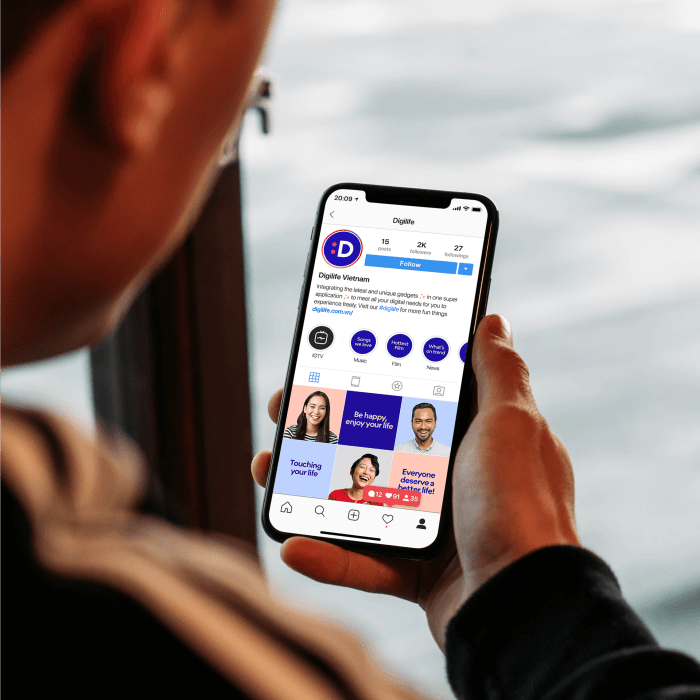Unlocking Success: Digilife Influencer Marketing Tips
With digilife influencer marketing tips at the forefront, this paragraph opens a window to an amazing start and intrigue, inviting readers to embark on a storytelling journey filled with unexpected twists and insights. In today's digital landscape, influencer marketing has become a powerful tool for brands to connect with their target audience in authentic and engaging ways.
As we delve into the world of influencer marketing, we will explore key strategies, best practices, and real-life examples that showcase the impact of collaborating with influencers in the digital age.
Introduction to Digilife Influencer Marketing

In the digital age, influencer marketing has become a powerful tool for brands to connect with their target audience through social media platforms. Influencer marketing involves collaborating with individuals who have a large following and influence over their audience to promote a product or service.
This form of marketing allows brands to reach a wider audience and build credibility through trusted individuals.
Importance of Influencer Marketing in the Digital Age
Influencer marketing is crucial in the digital age as consumers increasingly turn to social media for product recommendations and reviews. By partnering with influencers who align with their brand values, companies can leverage the influencers' credibility and reach to create authentic connections with their target audience.
This can lead to increased brand awareness, engagement, and ultimately, sales.
- Increased brand visibility: Influencers can help expose your brand to a larger audience that may not have been reached through traditional marketing channels.
- Trust and authenticity: Consumers are more likely to trust recommendations from influencers they follow, leading to higher conversion rates.
- Engagement and interaction: Influencers can create engaging content that sparks conversations and interactions with their followers, creating a more personalized connection with the brand.
Examples of Successful Influencer Marketing Campaigns
In recent years, many brands have seen great success with influencer marketing campaigns. One notable example is the partnership between fashion brand Fashion Nova and influencer Kylie Jenner. By collaborating with Kylie, Fashion Nova was able to reach millions of her followers and sell out their products within hours of her promoting them on social media.
-
“#LikeAGirl” Campaign by Always: This campaign aimed to empower young girls and challenge stereotypes. By partnering with influencers and celebrities, Always was able to spread their message to a wider audience and create a powerful impact.
-
Daniel Wellington and Influencers: The watch brand Daniel Wellington has built a strong presence on social media by partnering with influencers to showcase their products in a lifestyle context. This has helped them reach a global audience and increase brand awareness.
Identifying the Right Influencers
Identifying the right influencers for your brand is crucial to the success of your influencer marketing campaign. It involves finding individuals who align with your brand values and have an audience that is engaged and interested in your products or services.When choosing influencers, it is essential to consider the following factors:
Relevance to Your Brand
- Look for influencers whose content and values align with your brand. This ensures authenticity and credibility in promoting your products or services.
- Consider the niche or industry in which the influencer operates to ensure they can reach your target audience effectively.
Engaged Audience
- Choose influencers with an engaged audience who actively interact with their content. Look for high engagement rates, such as likes, comments, and shares, to gauge the level of involvement of their followers.
- An engaged audience is more likely to trust and act upon the recommendations of the influencer, leading to better results for your campaign.
Authenticity of Influencers
- Verify the authenticity of influencers by examining their past collaborations, content quality, and audience interactions.
- Avoid influencers who have fake followers or engagement, as this can harm your brand reputation and lead to ineffective campaigns.
Building Relationships with Influencers

Building strong relationships with influencers is crucial for successful influencer marketing campaigns. By establishing trust, understanding their needs, and fostering a meaningful connection, brands can create lasting partnerships that benefit both parties. Long-term collaborations with influencers can lead to increased brand awareness, credibility, and ultimately drive sales.
Here are some strategies to build and maintain relationships with influencers:
Communication is Key
- Regularly communicate with influencers to keep them updated on campaign progress, feedback, and future opportunities.
- Listen to their input and ideas, and incorporate them into the campaign to show that their opinions are valued.
- Provide clear guidelines and expectations to avoid any misunderstandings or miscommunication.
Offer Value and Support
- Provide influencers with exclusive access to products, events, or information to make them feel appreciated and special.
- Offer support in their personal projects or initiatives to build a genuine connection beyond the business partnership.
- Compensate influencers fairly for their work and time to show respect for their efforts and dedication.
Build Trust and Transparency
- Be honest and transparent in your communications with influencers to establish trust and credibility.
- Share feedback and results openly to show the impact of their efforts on the campaign and the brand.
- Respect their creative freedom and allow them to express their unique voice and style in the collaboration.
By implementing these strategies and fostering strong relationships with influencers, brands can create authentic and impactful partnerships that resonate with their target audience and drive tangible results.
Creating Effective Influencer Marketing Campaigns
Developing a successful influencer marketing campaign requires a strategic approach that resonates with both the influencer's style and their audience. By aligning the campaign with these key elements, brands can maximize their reach and engagement. Additionally, storytelling plays a crucial role in influencer marketing, helping to connect with the audience on a deeper level and create a lasting impact.
Developing Creative and Impactful Campaigns
- Understand the influencer's audience: Conduct thorough research to gain insights into the demographics, interests, and preferences of the influencer's followers. This information will help tailor the campaign to resonate with the target audience.
- Create a unique value proposition: Develop a compelling message that highlights the benefits of the product or service being promoted. Focus on what sets the brand apart and why the audience should take action.
- Utilize authentic storytelling: Encourage the influencer to share personal experiences or anecdotes related to the brand, creating a genuine connection with their followers. Authenticity is key to building trust and credibility.
Aligning Campaigns with Influencer Style and Audience
- Collaborate closely with influencers: Involve influencers in the campaign planning process to ensure their input and creative vision are integrated. This collaborative approach will result in content that feels natural and engaging.
- Tailor content to fit the platform: Consider the unique characteristics of each social media platform where the influencer is active. Adapt the campaign content to suit the format and audience expectations of each platform.
- Stay consistent with the influencer's brand: Maintain a consistent brand voice and aesthetic across all campaign materials to reinforce the influencer's personal brand and maintain authenticity.
The Role of Storytelling in Influencer Marketing
- Evoke emotion and connection: Use storytelling to create an emotional connection with the audience, making the brand message more relatable and memorable. Emotions drive engagement and can lead to higher conversion rates.
- Showcase real-life experiences: Encourage influencers to share real-life stories that demonstrate how the brand has positively impacted their lives. Authenticity and relatability are key to capturing the audience's attention.
- Highlight the brand's values: Incorporate the brand's values and mission into the storytelling to communicate a deeper message and resonate with the audience on a values-driven level.
Measuring the Success of Influencer Marketing

In order to determine the effectiveness of your influencer marketing campaigns, it is crucial to track key metrics that provide insights into the performance and impact of your efforts. By analyzing these metrics, you can assess the return on investment (ROI) of your influencer marketing strategies and make data-driven decisions to optimize future campaigns.
Key Metrics to Track
- Engagement Rate: Monitor the likes, comments, shares, and overall interaction generated by the influencer's content to gauge audience engagement.
- Reach and Impressions: Measure the number of people exposed to the influencer's posts to assess the campaign's visibility and potential audience reach.
- Click-Through Rate (CTR): Track the percentage of clicks on the influencer's content that lead to your website or landing page, indicating the effectiveness of driving traffic.
- Conversion Rate: Evaluate the percentage of conversions (such as purchases, sign-ups, or downloads) resulting from the influencer's promotion to measure the campaign's impact on driving actions.
Analyzing ROI of Influencer Marketing Efforts
To calculate the ROI of your influencer marketing campaigns, compare the costs incurred (including influencer fees, content creation, and campaign management) against the revenue generated or the value of the desired actions taken by the audience. By analyzing the ROI, you can determine the profitability and efficiency of your influencer partnerships and make informed decisions for future collaborations.
Tools and Platforms for Measuring Success
- Google Analytics: Utilize Google Analytics to track website traffic, conversions, and user behavior resulting from influencer referrals.
- Social Media Analytics: Platforms like Instagram Insights, Facebook Analytics, and Twitter Analytics provide data on post performance, audience demographics, and engagement metrics.
- Influencer Marketing Platforms: Tools such as AspireIQ, Traackr, and Upfluence offer features for tracking campaign performance, managing influencers, and analyzing ROI metrics.
- URL Tracking: Create unique UTM parameters for influencer links to monitor traffic sources and campaign attribution accurately.
Ultimate Conclusion
In conclusion, mastering digilife influencer marketing tips is essential for brands looking to thrive in the competitive digital space. By identifying the right influencers, nurturing strong relationships, creating impactful campaigns, and measuring success effectively, brands can leverage the power of influencer marketing to drive engagement, build trust, and achieve their marketing goals.
FAQ Overview
How can I identify the right influencers for my brand?
To identify the right influencers, consider factors such as relevance to your brand, engagement with their audience, and authenticity in their content.
What role does storytelling play in influencer marketing?
Storytelling is crucial in influencer marketing as it helps create a connection with the audience, making the brand message more relatable and memorable.
What are key metrics to track the success of influencer campaigns?
Key metrics include engagement rates, reach, conversions, and brand sentiment to measure the effectiveness of influencer campaigns.